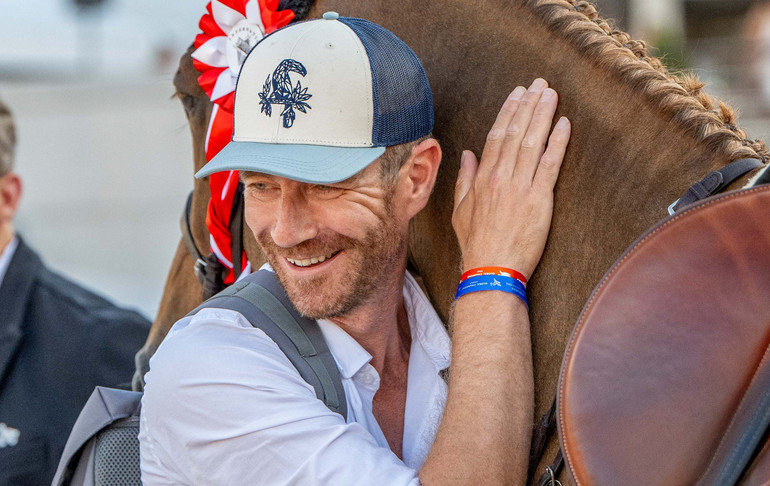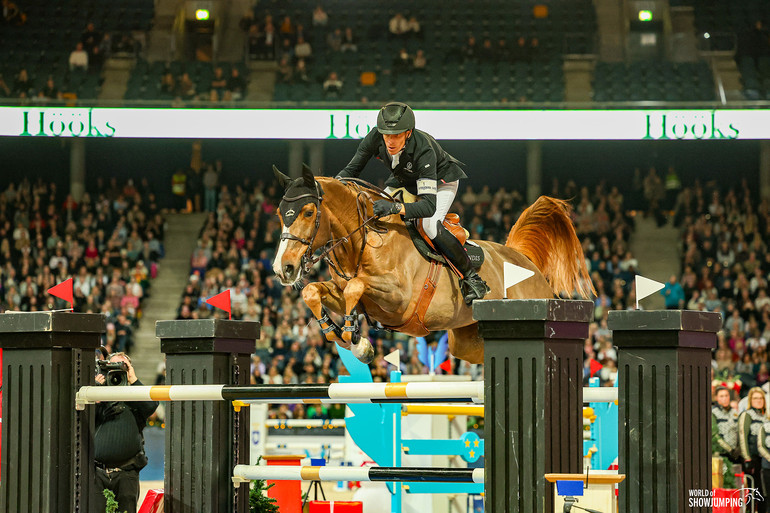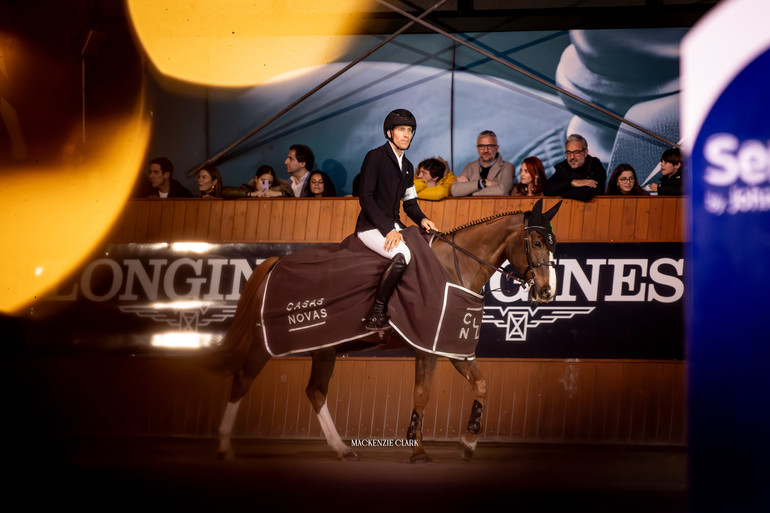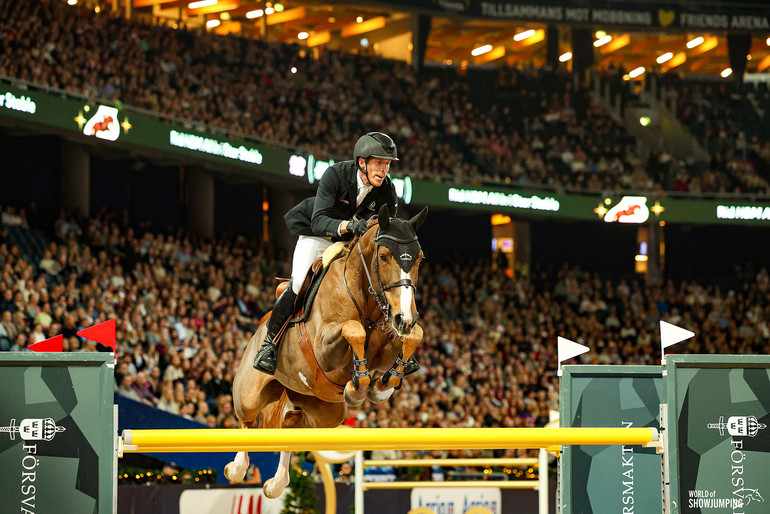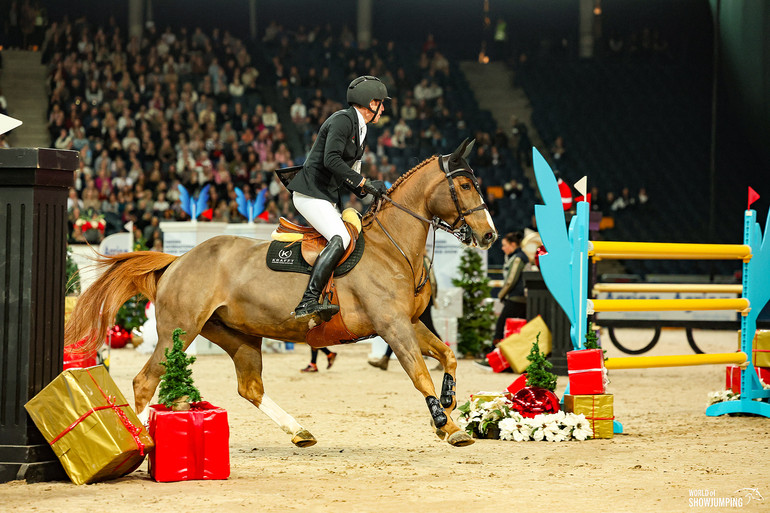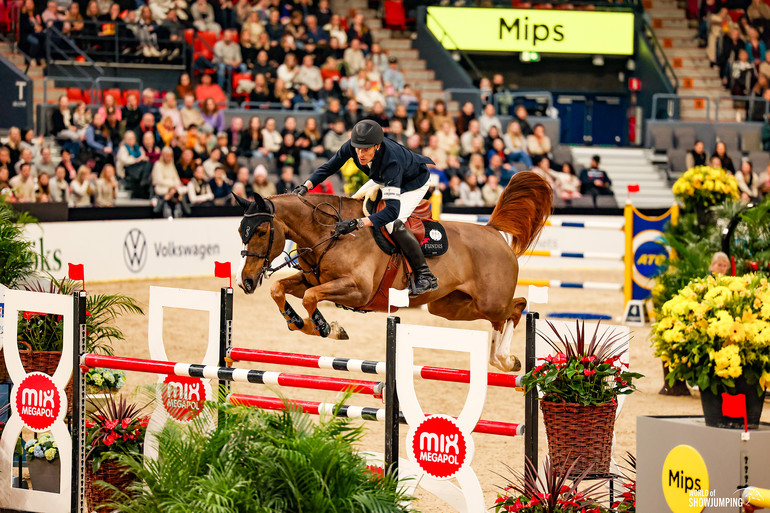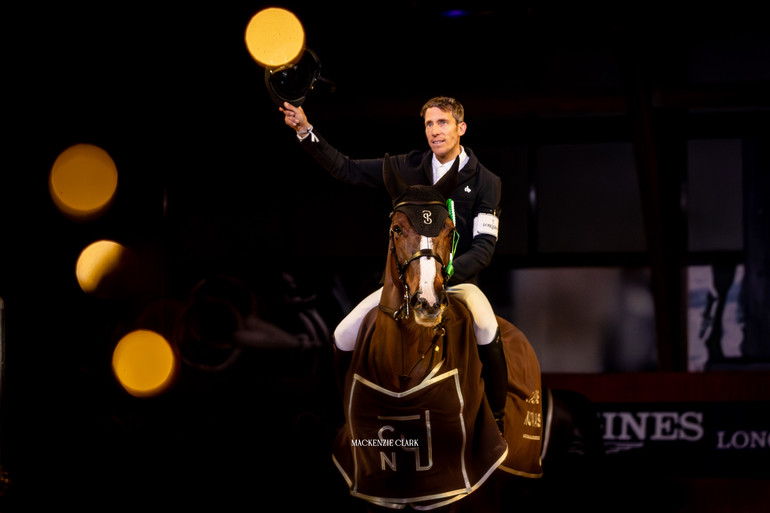Text © World of Showjumping
“It's not easy to find your place in a stable of cracks like King Edward, Iliana, Glamour Girl and Calizi. However, the 2023-season showed us that Dzara has found her place among the best horses in the world,” Sébastien Fonck – the breeder and owner of Henrik von Eckermann’s Dzara Dorchival (Qlassic Bois Margot x Raphael) – tells WoSJ.
Von Eckermann took over the reins on the now 11-year-old chestnut mare in February 2022 and the pair ended their first year together by placing 5th in the World Cup of London – which in hindsight can be seen as a prelude on what was to come in 2023.
Last year, the two recorded an astonishing list of top results, winning on five-star level in Gothenburg, La Coruna, London, Lyon, Madrid, Monaco and Stockholm, as well as placing 3rd in the CSI5* World Cup of Helsinki, 11th in the CSI5* World Cup of Oslo and 7th in the CSI4* Grand Prix in Ascona.
Rieke 63 + Qlassic Bois Margot
Dzara was an unproblematic foal and grew up with three other foals of that year. “She was dominant and knew how to get respect,” Fonck recalls. “When she was two, we could see that she had something special in her compared to the others. Her natural ability to jump was fantastic, but above all, what was so different about her was her mind: She was never impressed with anything, she was in charge. At the French championships for two-year-old fillies, she finished third, and as a four, five and six-year-old, she did a few shows and always showed a lot of quality and a super mentality.”
Above all, what was so different about her was her mind
“Dzara's mother Rieke 63 – whom I found thanks to Hubert Bourdy – is a small bay mare, well-built with a pretty head,” Fonck continues. “She brings together the good German origins of Ramiro, Sandro and Gotthard. She herself competed up to 1.45m level and has two sisters who competed at 1.50m and 1.60m level. Dzara's father is Qlassic Bois Margot. When choosing a stallion for Rieke, I was watching La Baule on TV. This is where I saw Qlassic for the first time, under the saddle of Simon Delestre. I really fell in love with this horse – and Rieke’s new husband was found! I thought he could bring strength and stride to Rieke, and Dzara has proven that right.”
Matching philosophy
“When Dzara was eight, I started to think about the future,” Fonck explains when asked what led him to choose von Eckermann as the rider for his talented mare. “I wanted her to have a chance of reaching the top of the sport. When she was seven and eight, Thomas Leveque competed with her and they had two magnificent seasons. However, I knew that in order to get into the biggest shows, I would have to find another rider.”
I have realized that what gives me the most thrill is living this adventure as her owner
“During Equita Lyon in 2021, Eric Louradour – a friend of mine – told me about the system Henrik had and what he had built together with his wife Janika Sprunger. On Sunday evening, I messaged Henrik and sent him some videos of Dzara. In his reply, he told me that he and Janika had looked at the mare and that they really liked her. We arranged to meet at CHI Geneva a month later and after having a talk, I knew it was with them I wanted Dzara to be. Apart from both of them being excellent riders, I could totally relate to their philosophy, with the well-being of their horses as the leading factor.”
Remaining an owner instead of selling Dzara is something Fonck has done out of love for his horse. “This way, I remain involved in decisions made about her and her career. And when you love your horses the way I love them, it’s reassuring to have this protective role. However, it has been a major challenge; she has always been in great demand from potential buyers. I have had to ask myself the question of keeping her or letting her go many times. Through those moments of doubt, I have realized that what gives me the most thrill is living this adventure as her owner, being able to have a say about her future, and money has become secondary. Few people understand my decision, but experiencing a year like 2023 was priceless. Whatever happens, I will never regret my decision.”
Elevage Dorchival
Fonck’s true passion, however, is breeding. “I love breeding,” he says. “I like to think about my crosses, manage births, see the foals develop with their mothers. With Dzara, I have put her breeding career completely on the back burner – sport comes first for her now, and in my opinion, it is impossible to do both at the same time.”
I love breeding
Currently, Fonck has around forty horses in his breeding operation at Elevage Dorchival, which he runs together with Jeremy Cropet. “He manages the care of the horses on a daily basis,” Fonck – who also works as a pharmacist – says. “Our horses are on the field all year round. We have up to eight foals born every year, but in the future, we plan to return to a maximum of four foals annually. The bloodlines we have developed have given us very good sport horses, but I want to concentrate on two or three mares who have excellent potential, especially Dzara’s family. I am lucky to have a sister and two daughters from Dzara and even a grand-daughter… So the future is assured.”
In his breeding, Fonck has also experimented with the new, progressive methods, such as ICSI [Editor’s note: Intracytoplasmic sperm injection]. “I took advantage of this new technology already five years ago and had good results; the first foals are now four. I found it fantastic to be able to hope for a foal from Baloubet du Rouet, Cornado NRW and other stallions whose semen was no longer available or sterile. Subsequently, I questioned the ethics of this new technology; isn’t it too invasive? I think ICSI has its place in breeding, but what bothers me are embryo manufacturers who do not hesitate to have their mares punctured all winter, every year, and end up with dozens and dozens of embryos in the freezer. Can this still be considered breeding?”
Top sport through the lens of a breeder and owner
Last year, Fonck followed the very top of the sport from the inside and got to compare the more historical and traditional events to the Longines Global Champions Tour, as well as experiencing the difference in the roles of a breeder and an owner. “For me, the most thrilling events are the major championships – like the Europeans, World Championships and the Olympic Games – as well as all the traditional competitions such as Aachen, La Baule, Geneva and Lyon."
Breeders are not recognized and rewarded enough for the work they do
"However, I must admit that the organization at the LGCT is perfect; the competitions are magnificent, there is a slightly more of a showbiz and VIP vibe, and as an owner, it is very pleasant to be invited to these shows. Additionally, the prize money at these shows is good. When it comes to money – which is also what sustains the high-level riders – the LGCT-circuit can be very profitable. Another point that we must note is that LGCT allows riders who are low in the world ranking to participate in high-level events – which doesn't bother me. This system should not be considered a norm though; showjumping must remain a purely sporting circuit and the right to participate must be based on merit. Money should not have a ruling power at the highest level. I believe all the current shows can co-exist. What I find unfortunate, is that there is a competition in terms of the calendar – requiring the riders to choose between one or the other.”
“One thing is certain; breeders are not recognized and rewarded enough for the work they do,” Fonck continues. “Let's not forget that without breeders there are no horses, and without horses there will be no riders! In France, we are starting to hear a discussion about a bonus which would be calculated based on the prize money a horse wins; that would be a fair return. The owners, for their part, are more highlighted and considered than the breeders. It is the owners who allow riders to have horses for the top sport, and it is them who carry the most financial risk that this implies. Even if the highest level of the sport is a passionate environment, money does play a dominating role. Personally, as a breeder and owner of Dzara, I am living this adventure to 100% and I am satisfied on all levels – for me, the financial aspect is secondary.”
The owners, for their part, are more highlighted and considered than the breeders
“Concerning animal welfare, this must be a priority,” Fonck points out. “And we see that things have been evolving a lot in this direction for some time. All stakeholders must be concerned, without exception. We must no longer accept any act or behaviour that causes suffering to our horses. National and international federations must be uncompromising and not hesitate to take action and impose sanctions; sometimes I have a feeling that they are turning a blind eye.”
His priority: Dzara
It has been two years since Dzara joined von Eckermann at Cyor Stables. “The negative point is that the stables are very far from home, so I can't see Dzara as often as I would like,” Fonck says. “To compensate, Henrik, his groom Louise and Dominique – Janika's mother – give me news very often, with photos and videos. I go visit them at shows as often as I can and it’s always a pleasure to share some time with Henrik and his team. Henrik leaves no room for chance or improvisation; everything is thought out, reflected – and this reassures me.”
“We will see what the future has in store for us. The priority is that Dzara is in good shape and that she stays that way. And when her sporting career is over, I will be the happiest man in the world to see her return home to her native land – and perhaps give us a few more foals.”
30.1.2024 No reproduction of any of the content in this article will be accepted without a written permission, all rights reserved © World of Showjumping.com. If copyright violations occur, a penalty fee will apply.



